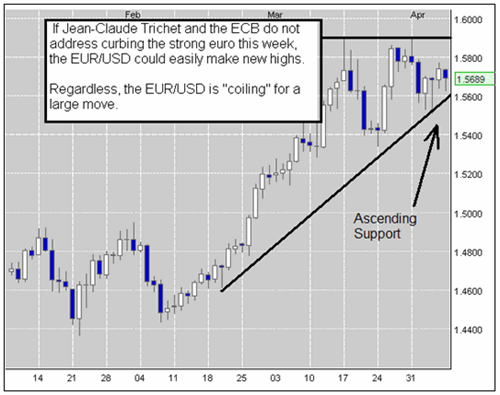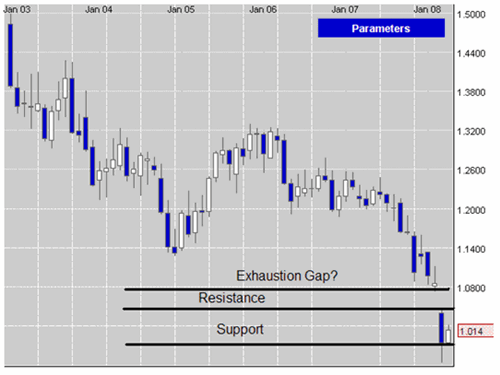FOREX Support and Resistance
1. EUR/USD – Setting Up for a Large Move
All eyes will be on the EUR/USD this week. The currency pair has been consolidating for almost a month, after hitting an all-time high in March.
In technical analysis terms, consolidation is also known as “coiling”. Imagine a rattlesnake coiling, just before striking.
The euro could begin to decline if:
1. Jean-Claude Trichet comments on curbing strength of the euro at any time this week, especially after the ECB’s interest rate meeting on Wednesday, or at the G7 meeting on Friday.
2. The ECB surprises the market and lowers the Main Refinancing Rate from 5.00% to 4.75% on Wednesday.
3. The EUR/USD violates 1.5600, thus taking out ascending support of the relative range.
Look for fresh highs if:
1. Jean-Claude Trichet and the ECB completely blow off making any comments on the strength of the euro.
2. The U.S. Treasury, or Federal Reserve make any specific comments that they will not discuss the monetary policy, other than strengthening Asian currencies.
3. The EUR/USD takes out the high, posting a DAILY CLOSE above 1.5904. A close above the 1.5900 whole number could easily bring breakout bulls in off the fence, while also triggering a surge in short covering. A breakout could lead to capitulation.

2. USD/CHF – Exhaustion Gap on Monthly Chart?
Many monthly charts with the U.S. dollar look like the USD/CHF chart… showing a considerable gap down two-periods ago.
By definition, an exhaustion gap is a significant gap after a prolonged trend. When exhaustion gaps occur, it means demand is beginning to wane, and traders begin looking for a reversal.
1. Look for a reversal (if even only short-term), if the USD/CHF trades into the gap window at 1.5409.
2. However, if the USD/CHF takes out the low of this period at 0.9932, traders could easily test a new low. If this scenario occurs, the USD/CHF will likely more than just “test” lows and could easily surge downward in a capitulatory move.
On Monday, the Switzerland Employment Report showed the unemployment rate declined to 2.6% in March, over 2.7% in February. Despite this news, subprime is hurting the Swiss banking business and could cause employment to slip as the year progresses.
Moreover, strength in the franc is hurting exports from the country, another factor that could hinder employment growth.
The economic news coming out of Switzerland is pointing to an exhaustion gap; however, times like these can produce one last capitulatory decline, to shake out all weaker hands. Comments from the ECB on Wednesday will drive the franc. Slowing growth in the larger Euro Zone, partially due to the elevated euro, is affecting growth in Switzerland.

Exit is everything.
Mark Whistler
Mark Whistler is the founder of www.WallStreetRockStar.com and is the author of multiple books on trading. Mark’s newest book, The Swing Trader’s Bible – co-authored with CNBC/Fox News regular guest Matt McCall – will be on shelves in late summer, 2008. In addition, Mark also writes regularly for TraderDaily.com and Investopedia.com.
